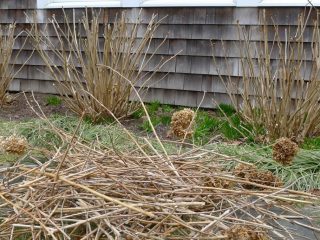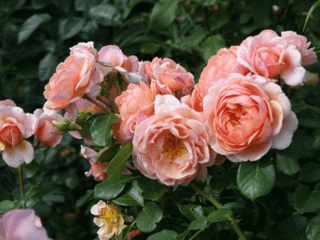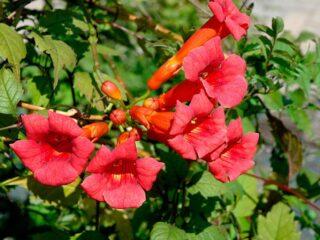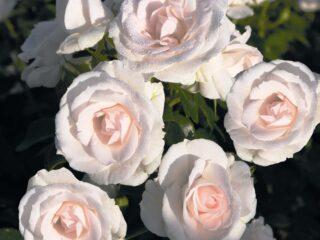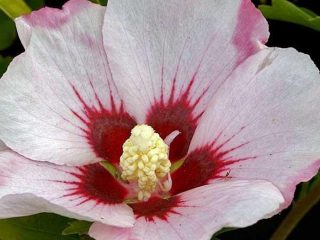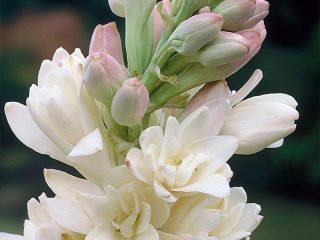Content
Rose Nadya Meyandekor is a relatively young variety of ground cover plant that will become a real decoration of any garden. It is chosen for its aesthetic appearance, long flowering and pleasant aroma.

The rose tolerates cold snaps and unfavorable weather conditions well, so it can be grown in any climate zone
Breeding history
The rose Nadia Meillandeco first saw the light of day at an exhibition in 2006. She was bred at the Meilland International nursery located in France. Most likely, the variety got its name in honor of Nadine Meilhan, who is the wife of Allen Meilhan. This is a breeder and one of the company's managers.
The rose has several names by which it is known. It was registered under the name MElbalneo. Exhibition names are Nadia Meillandeco and Sunny Meidiland. In Russian-speaking countries she is known by two names: Nadya Meyandekor and Nadya Meidiland.
Description and characteristics of roses Nadya Meyandekor
This variety of rose belongs to the scrub category. However, it is most often grown as a ground cover plant.This is due to the fact that the rose actively grows in width and prefers to spread along the ground. If you tie it to a support, it can be used as a climbing variety.
The rose has a powerful and spreading bush. When grown as a ground cover plant, its height will be about 40 cm. In this case, the branches will be turned upward, thereby forming a green carpet with yellow flowers. When growing the Nadya Meyandekor rose on a trunk, its height will be about 1.5-1.7 m.

The width of the bush can reach up to 1.5 meters
It consists of flexible and powerful shoots. They are abundantly covered with leaves of a light green hue with a glossy surface. Each shoot contains about 10-15 buds. They have a goblet shape and are quite large in size.
Rose is a repeat flowering plant. The first wave is the brightest, the buds begin to bloom in early June. The second and third times are not as intense, but flowering lasts until the first frost.
The buds are colored pale yellow. The flowers are densely double and, when blooming, acquire a spherical shape. They can reach up to 12 cm in diameter. When fully bloomed, they are colored yellow in the middle, which gradually brightens and turns white towards the edges. Each flower has about 100 petals. They are located symmetrically; a harmonious and complex structure can be traced.
It takes 3-4 days for a Nadya Meyandekor rose bud to bloom. The flower remains in this form for about five days, after which it begins to fade. The outer petals turn brown and fall off. When flowering, the Nadya Meyandekor rose variety exudes a pleasant, subtle aroma.

Wilted cores do not fall off for a long time, so it is recommended to remove them yourself to make the bush decorative
The second and third waves of flowering differ from the first in having smaller buds. They are mainly grouped on the upper parts of the shoots.
The rose variety Nadia Meillandecor has good resistance to frost and adverse weather conditions. It can survive cold temperatures down to -30 OC. Roses have good immunity to diseases and pests characteristic of this crop. The variety is suitable for growing in different climatic conditions.
Advantages and disadvantages
Branches may bend toward the ground under the weight of buds and foliage. To prevent this, the bush should be tied up or supported.

Rose variety Nadya Meyandekor is suitable for creating bouquets
Advantages:
- abundant and continuous flowering;
- fast growth;
- frost resistance;
- interesting colors;
- versatility of use;
- pleasant aroma.
Flaws:
- you need to water and fertilize frequently;
- does not grow well as a headquarters.
Planting and care
To plant roses, you should choose a well-lit place, protected from direct sunlight and drafts. It is important that there is no groundwater nearby. For roses, you should choose a place with an acidity of 5 to 6.5 pH.
The best time to plant a seedling in open ground is early to mid-May. It is important that the likelihood of frost passes and the soil has time to warm up. In addition, roses can be planted in early September. The planting process includes the following steps:
- Inspect the seedlings for damage. All dried and diseased roots should be removed.
- If the seedling has an open root system, then before planting it should be placed overnight in water at room temperature. He needs to be dropped off in the morning.
- Dig a hole.Place a support on the bottom.
- Place the seedling in the hole. The root collar should be buried 5 cm.
- Fill the hole with soil mixed with humus and sand. Moisten the soil.
The soil around the seedling should be hilled up and mulched. When the formation of green shoots begins, you need to rake away the protective layer.
Caring for a Nadya Meyandekor rose consists of regular watering. It is necessary to moisten the soil as the top layer dries. It is recommended to use settled warm water. You need to pour it under the root so that it does not fall on the flowers. At the end of summer, soil moisture should be stopped.
It is recommended to fertilize the Nadia Meillandecor rose three times per season. In the spring, it is worth using nitrogen-based fertilizing. In summer it is necessary to apply potassium-phosphorus fertilizer. In the autumn, the rose needs potassium-based feeding.
The plant needs to be pruned periodically. In the spring, it is worth removing all branches damaged after winter. At the end of summer, you need to shorten the shoots, leaving only 40 cm. Once every five years, the rose requires anti-aging pruning. To do this, you need to shorten the entire bush, leaving about 30 cm.
The Nadia Meillandecor rose has good frost resistance. When grown in warm regions with snowy winters, the plant does not need to be wrapped for the winter. Otherwise, he will need shelter. To do this, you should collect all the lashes together and cover the bush with mulch. You can use dry leaves or spruce branches. The resulting structure should be wrapped in burlap or film on top. After the onset of warmth, you need to remove the shelter and begin to prepare the rose for flowering.
Reproduction methods
Cuttings are suitable for propagating the Nadya Meyandekor rose.The best time to carry out this procedure is the first half of June, after the start of flowering.

Cuttings should be cut with a disinfected sharp knife.
You need to select young shoots of medium thickness. You need to cut off the cutting about 10-12 cm along with the bud. The optimal number of buds is 3. To stimulate growth, you can use the drug Kornevin. The cutting needs to be deepened into the ground slightly above the lower bud, positioned at an angle.
To make the plant take root faster, it should be covered with a jar or bottle. The cover must be removed during the day.

After 21 days, if the cutting takes root, the jar or bottle should be removed
Diseases and pests
The rose variety Nadya Meyandekor has good resistance to diseases and pests characteristic of this crop. If care recommendations are not followed and in unfavorable weather conditions, it can become infected.
Fungicides will help get rid of powdery mildew and black spot. A solution of copper sulfate has a good effect. Signs of powdery mildew and black spot are most common in late summer and early fall. The rose quickly grows green mass, so the affected ones are replaced by new leaves.
Application in landscape design
Rose variety Nadya Meyandekor is a universal bush that can be used as a ground cover, scrub, or climbing plant. It is suitable for both group and single plantings.

The rose can be placed near a wall or any other support
With its help you can decorate borders, paths, and small slopes. It looks beautiful in the lower parts of compositions when it spreads along the ground.

Rose variety Nadya Meyandekor harmonizes well with flowers of white and red shades
Conclusion
Rose Nadya Meyandekor is a universal plant that has a wide range of applications in landscape design. It has good immunity to major diseases and pests of the variety, and is not difficult to care for. Thanks to long and abundant flowering, the rose bush will look great until frost.
Reviews of the rose Nadya Meyandekor





